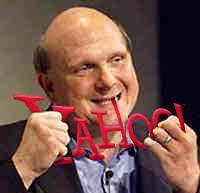 Steve Ballmer had been looking into this deal with sky high hopes and desperation. But a bad news was awaiting to settle down his excitement. The Wall Street reacted negatively to Yahoo’s plan to hand over its Internet search and advertising reins to Microsoft.
Steve Ballmer had been looking into this deal with sky high hopes and desperation. But a bad news was awaiting to settle down his excitement. The Wall Street reacted negatively to Yahoo’s plan to hand over its Internet search and advertising reins to Microsoft.
“Nobody gets it,” he said about the deal, unveiled Wednesday after more than a year in the making.
Under terms of the 10-year deal, Microsoft’s Bing search engine and adCenter platform will power Yahoo’s search-based advertising business, while Yahoo’s sales team will handle both companies’ premium search customers.
Ballmer attempted to explain why the deal will benefit both companies and to perhaps repair some of the damage to Yahoo’s stock price.
While Microsoft’s stock went up after the deal was announced, which seems like a Good news for Microosft, Yahoo’s dipped. As of now, Friday morning, it is trading at US$14.64, down 15 percent from where it was before the deal and half the price Microsoft originally offered to pay for each share of Yahoo when it made its $44.6 billion unsolicited bid last February.
Wall Street had expected Yahoo to come away from the deal with a sizeable cash payment from Microsoft up front for its search assets, but that wasn’t the case, which largely explains why investors reacted negatively.
Ballmer acknowledged that since there was no exchange of money in the deal, investors and analysts are clearly puzzled.
“Economics is where people get even more confused,” he said. “What happened? Nothing got bought. Nothing got sold.”
Still, Ballmer said he’s not sure why Wall Street would be sour on a deal in which Yahoo will generate about $500 million in operating income and a savings of about $200 million in capital expenditures once it closes. “That’s one that stuns me,” he said.
For Yahoo, the big boon of the deal is it’s taking significant operating and  R&D costs out of its business while retaining 88 percent of the search revenue it is already getting, because Microsoft will pay Yahoo traffic acquisition costs at an initial rate of 88 percent during the first five years of the agreement, Ballmer said.
R&D costs out of its business while retaining 88 percent of the search revenue it is already getting, because Microsoft will pay Yahoo traffic acquisition costs at an initial rate of 88 percent during the first five years of the agreement, Ballmer said.
Both companies will get scale out of the deal, allowing them to reach a larger network of advertisers and users. This will lead to improvement of the search product, but not financial improvement as far as revenue growth right away, he said.
“The more queries you can see, the more you can tune your product, The more advertisers advertise on your system and the more relevant they make their ads for your users. The advertising is part of the actual user experience.”
Even as he defended the deal, Ballmer on Thursday seemed conscious of the fact that Microsoft blundered in search by not investing early enough, and suggested that the company has learned a lesson from the long time it took to close the Yahoo deal — time in which Google continued to grow its already sizeable market share in search.
“In our business in this industry, probably the greatest source of economic value creation is choosing to be in the right businesses early enough, When you don’t choose to be in early enough you have a problem. When you choose to stay out of a business that is economic value creation, you won’t grow with the market. If you are picking the right things that’s a very important call.”
He is certainly not happy. But is market mis-interpreting or do they understand something better than Yahoo and Microsoft?
loading...
loading...
